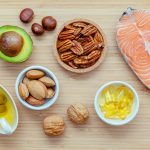 Beneficial fatty acids that are good for heart health and brain health; are anti-inflammatory; and help maintain neurotransmitter activity.
Beneficial fatty acids that are good for heart health and brain health; are anti-inflammatory; and help maintain neurotransmitter activity.
Fat molecules possessing less than the maximum possible number of hydrogen atoms. Diets that are high in monounsaturated fat content have been shown to reduce low-density lipoproteins (“bad” cholesterol) blood content, while leaving blood levels of highdensity lipoproteins (“good” cholesterol) essentially unchanged.
A type of unsaturated fat that can lower levels of harmful LDL (low- density lipoprotein) cholesterol without also decreasing levels of HDL (high-density lipoprotein cholesterol). Olive and canola oils are good sources of monounsaturated fats. Avocados and nuts are also sources.
Monounsaturated fats are fatty acids that have one double bond between carbon atoms, thus reducing the number of hydrogen atoms attached. Monounsaturated fats are better for the heart than are saturated fats. Olive oil and peanut oil are monounsaturated.
Plant-based fatty acids that have one double-carbon bond that are liquid at room temperature.
Present in olive, canola, and peanut oils, these lipids augment the concentration of high-density lipoprotein (HDL) cholesterol, while concurrently reducing low-density lipoprotein (LDL) cholesterol, thereby diminishing the potential of maladies.
A type of fat or fatty acid consisting of a solitary carbon atom with a double bond within its molecular structure. Palmitoleic acid and oleic acid are the most prevalent monounsaturated fats, naturally occurring in foods such as nuts and avocados. Olive oil primarily comprises oleic acid as its principal constituent.
